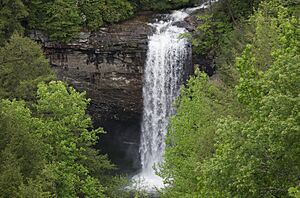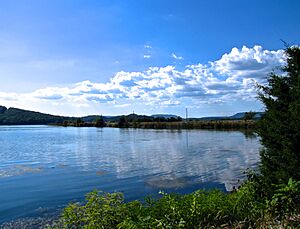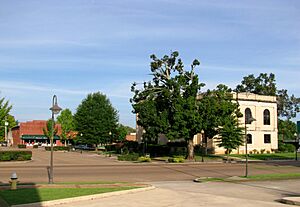Marion County, Tennessee facts for kids
Quick facts for kids
Marion County
|
|
|---|---|
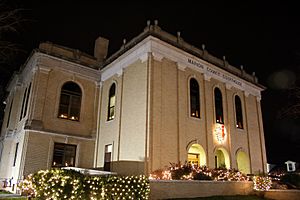
Marion County Courthouse in Jasper
|
|

Location within the U.S. state of Tennessee
|
|
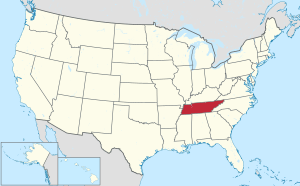 Tennessee's location within the U.S. |
|
| Country | |
| State | |
| Founded | 1817 |
| Named for | Francis Marion |
| Seat | Jasper |
| Largest town | Jasper |
| Area | |
| • Total | 512 sq mi (1,330 km2) |
| • Land | 498 sq mi (1,290 km2) |
| • Water | 14 sq mi (40 km2) 2.8%% |
| Population
(2020)
|
|
| • Total | 28,837 |
| • Density | 57/sq mi (22/km2) |
| Time zone | UTC−6 (Central) |
| • Summer (DST) | UTC−5 (CDT) |
| Congressional district | 4th |
Marion County is a county in the U.S. state of Tennessee. In 2020, about 28,837 people lived here. Its main town, called the county seat, is Jasper. Marion County is part of the larger Chattanooga area, which includes parts of Alabama and Georgia. The county is in the Central time zone.
Contents
History
Marion County was created in 1817. Long ago, Native American tribes lived here.
In 1779, a Cherokee chief named Dragging Canoe moved his people. They settled near Running Water creek. He helped build the town of Nickajack near Nickajack Cave. In 1794, soldiers from Nashville, Tennessee attacked and burned the town.
The Chickamauga Indians rebuilt Nickajack. They lived there until 1838. At that time, all Native Americans were forced to leave Tennessee, Alabama, and Georgia. This sad journey is known as the Trail of Tears.
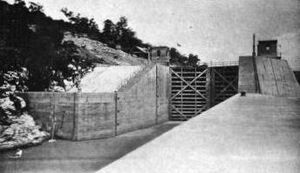
During the American Civil War (starting in 1861), people mined for saltpeter in Nickajack Cave. Saltpeter is a key ingredient for making gunpowder. The Confederate army took over the mining. Nickajack Cave became a major source of saltpeter for the Confederate States of America. Mining stopped in late 1862. Many soldiers visited the cave as they traveled on the Tennessee River.
Another important mine during the war was Monteagle Saltpeter Cave. It was about 4 miles (6.4 km) southeast of Monteagle. People reported seeing old mining equipment there even in 1917.
By the late 1800s and early 1900s, coal and iron mining became very important. Mines operated in places like Whitwell and Inman. Iron factories were in South Pittsburg.
The Hales Bar Dam was built on the Tennessee River. Construction lasted from 1905 to 1913. It was one of the first big dams built across a river that boats could use. In the 1960s, the Tennessee Valley Authority replaced Hales Bar Dam with Nickajack Dam. The old Hales Bar powerhouse is still there, used as a boathouse.
Geography
Marion County covers about 512 square miles (1,326 km²). Most of this is land, about 498 square miles (1,290 km²). The rest, about 14 square miles (36 km²), is water.
Marion County is in the Sequatchie Valley. This is a long, narrow valley that cuts through the Cumberland Plateau. The Sequatchie River flows through the valley. It empties into the Tennessee River near Jasper.
Nickajack Dam is on the Tennessee River near Jasper. It creates Nickajack Lake. The Raccoon Mountain Pumped-Storage Plant is also in the county.
Adjacent counties
- Grundy County (north)
- Sequatchie County (northeast)
- Hamilton County (east)
- Dade County, Georgia (southeast)
- Jackson County, Alabama (southwest)
- Franklin County (west)
State protected areas
- Chimneys State Natural Area
- Franklin State Forest (part)
- Hicks Gap State Natural Area
- Prentice Cooper State Forest
- Sequatchie Cave State Natural Area
- South Cumberland State Park (part)
Population
| Historical population | |||
|---|---|---|---|
| Census | Pop. | %± | |
| 1820 | 3,888 | — | |
| 1830 | 5,508 | 41.7% | |
| 1840 | 6,070 | 10.2% | |
| 1850 | 6,314 | 4.0% | |
| 1860 | 6,190 | −2.0% | |
| 1870 | 6,841 | 10.5% | |
| 1880 | 10,910 | 59.5% | |
| 1890 | 15,411 | 41.3% | |
| 1900 | 17,281 | 12.1% | |
| 1910 | 18,820 | 8.9% | |
| 1920 | 17,402 | −7.5% | |
| 1930 | 17,549 | 0.8% | |
| 1940 | 19,140 | 9.1% | |
| 1950 | 20,520 | 7.2% | |
| 1960 | 21,036 | 2.5% | |
| 1970 | 20,577 | −2.2% | |
| 1980 | 24,416 | 18.7% | |
| 1990 | 24,860 | 1.8% | |
| 2000 | 27,776 | 11.7% | |
| 2010 | 28,237 | 1.7% | |
| 2020 | 28,837 | 2.1% | |
| U.S. Decennial Census 1790-1960 1900-1990 1990-2000 2010-2014 |
|||
In 2020, Marion County had 28,837 people. There were 11,477 households and 8,114 families. Most people (about 89%) were White. About 3.6% were Black or African American.
In 2010, the county had 28,237 people. The population density was about 57 people per square mile (22 people/km²). About 22.8% of the people were under 18 years old. About 8.9% were 65 or older. The average age was 43.9 years. Slightly more than half the population (50.9%) was female.
Education
Marion County has several schools for students:
- Jasper Elementary School
- Jasper Middle School
- Marion County High School
- Monteagle Elementary School
- South Pittsburg Elementary
- South Pittsburg High School
- Whitwell Elementary School
- Whitwell Middle School
- Whitwell High School
- Richard Hardy Memorial School
Media
Marion County gets news and entertainment from many local and national sources. These reach about one million people in four states. These states are Tennessee, Alabama, Georgia, and North Carolina.
Newspapers
- The Marion Tribune started in August 2023. It is the only official newspaper in Marion County.
Radio
Marion County is part of the Chattanooga radio market. Some radio stations are based in Marion County cities:
- AM
- WEPG 910 AM – Plays Country music (from South Pittsburg)
- FM
- WUUQ 97.3 – Plays Classic Country music (from South Pittsburg)
- W285FW 104.9 - 104.9 The River WEPG (from South Pittsburg)
- WJCR-LP-94.7 - Jasper Christ-Centered Radio (from Jasper)
Television
Marion County is part of the Chattanooga TV market. Cable TV companies here include Charter Communications and Trinity Cable.
Transportation
Airport
Marion County Airport, also called Brown Field, is a public airport. It is about 4 nautical miles (7 km) southeast of Jasper.
Roads
 I-24
I-24 US 41
US 41 US 64
US 64 US 72
US 72 SR 2
SR 2
 SR 27
SR 27 SR 28
SR 28 SR 56
SR 56 SR 108
SR 108 SR 134
SR 134 SR 156
SR 156
 SR 283
SR 283 SR 377
SR 377 SR 422
SR 422- Orme Mountain Road
Parks and natural features
Nickajack Cave is a very old and important cave in Tennessee. It is located near Shellmound Station, on the west side of the Tennessee River. Today, it is part of a park run by the city of New Hope.
Visitors can walk on a paved trail to a viewing deck. From there, you can watch bats fly out of the cave at sunset. The cave used to be open for tours. But in 1968, the cave entrance was flooded. This happened when the Tennessee Valley Authority built Nickajack Dam about 6 miles (9.7 km) downstream. The new dam replaced the older Hales Bar Dam.
Communities
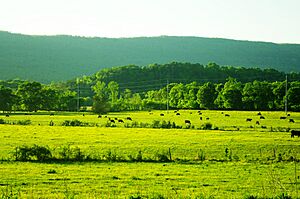
Cities
Towns
- Jasper (county seat)
- Kimball
- Monteagle (also in Franklin and Grundy Counties)
- Orme
- Powells Crossroads
Unincorporated communities
- Aetna
- Griffith Creek
- Haletown
- Jasper Highlands
- Mineral Springs
- Sequatchie
- Suck Creek
- Whiteside (formerly Running Water)
Notable people
- Eddie Brown, a player in the NFL.
- Jon Coffelt, an artist born in Dunlap, Tennessee and raised in Griffith Creek.
- Leslie Rogers Darr, a United States District Judge.
- Dragging Canoe, a Cherokee leader who lived in the area.
- Travis Randall McDonough, a United States District Judge.
- John T. Raulston, the Judge for the famous Scopes Trial in 1925.
- Sequoyah, a Cherokee scholar who lived near Marion County.
- Peter Turney, a former Governor of Tennessee.
- Eric Westmoreland, an NFL player.
See also
 In Spanish: Condado de Marion (Tennessee) para niños
In Spanish: Condado de Marion (Tennessee) para niños
 | Jackie Robinson |
 | Jack Johnson |
 | Althea Gibson |
 | Arthur Ashe |
 | Muhammad Ali |


